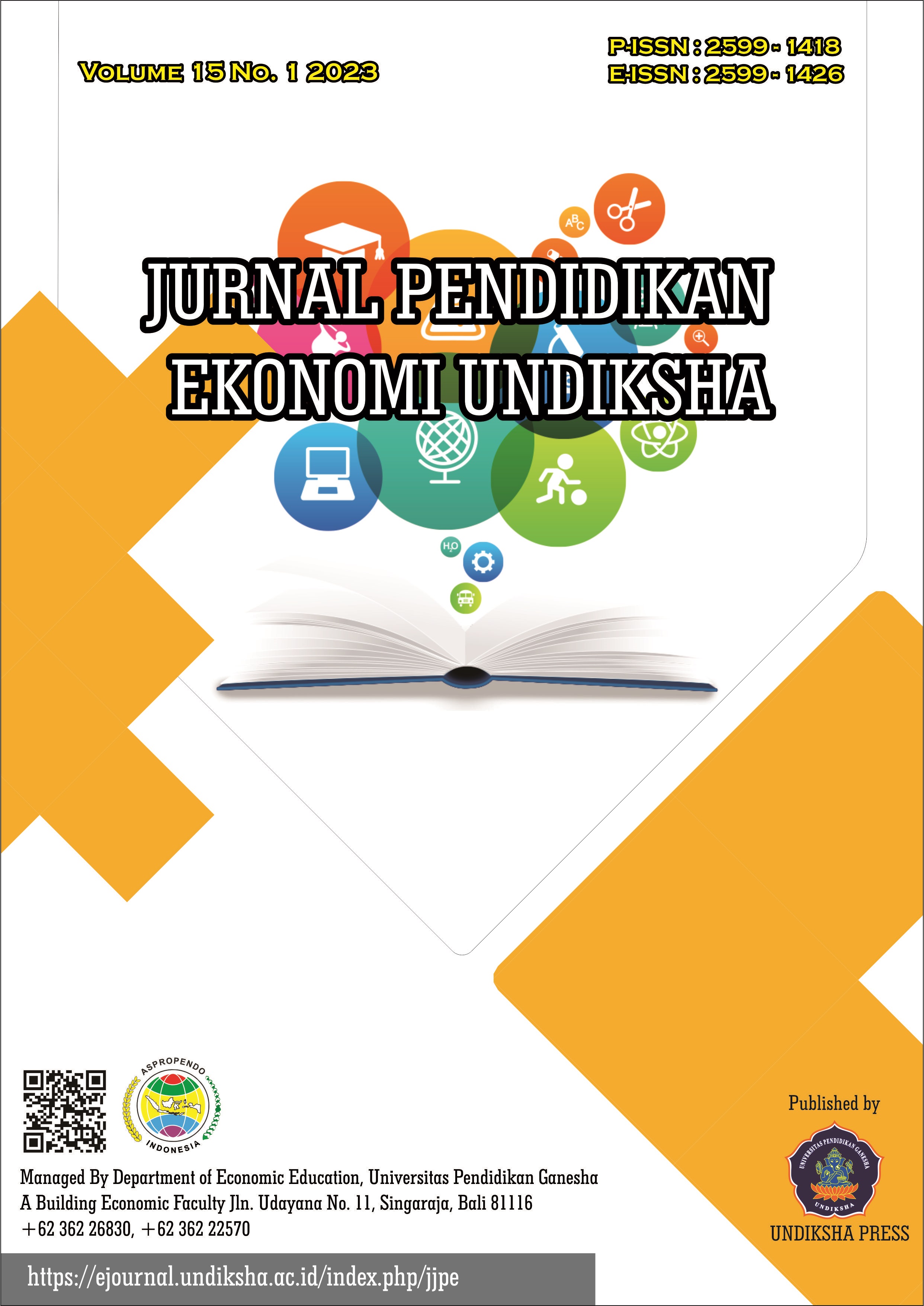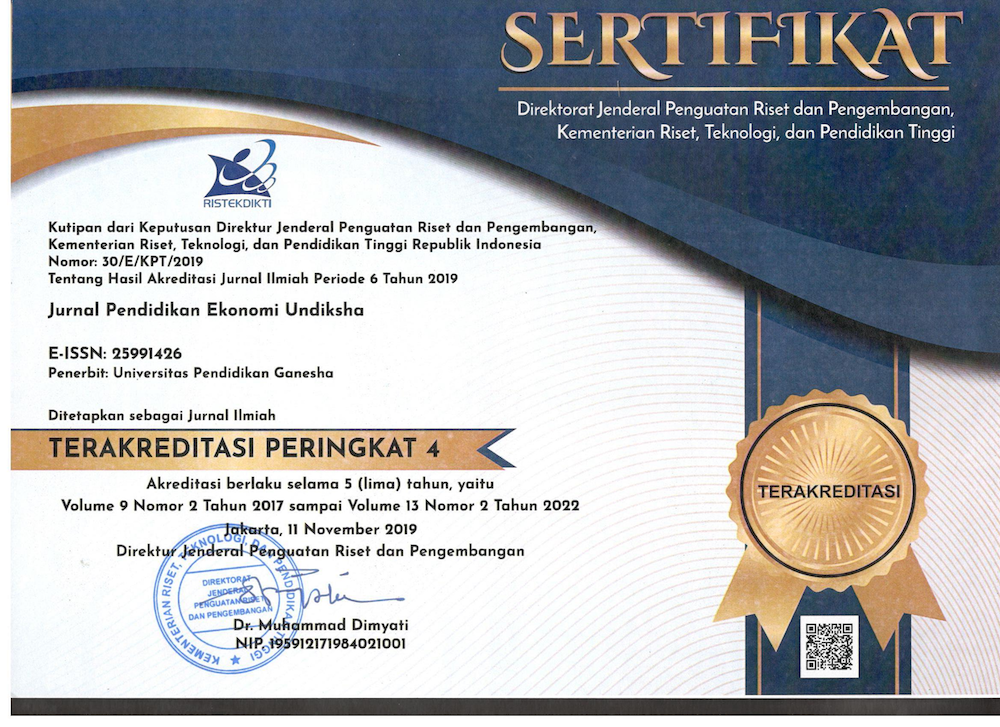Pengaruh Media Sosial dan Efikasi Diri terhadap Perilaku Konsumsi Siswa SMAN 3 Palangka Raya
DOI:
https://doi.org/10.23887/jjpe.v15i1.54366Keywords:
self-efficacy, the intensity of social media, consumption behaviorAbstract
Consumption behavior of students can be influenced by internal factors and external factors. There are several internal factors, one of which is self-efficacy, while external factors include the intensity of social media use. The purpose of this study was to determine how much influence self-efficacy and intensity of social media use on the consumption behavior of SMAN 3 Palangka Raya students. Data for the three variables (self-efficacy, intensity of use of social media, and consumption behavior) were obtained by distributing questionnaires to students of SMAN 3 Palangka Raya. The population of this study was 1635 students, while the sample was 509 students. Sampling technique using random sampling technique method. The results of this study indicate that consumption behavior can be influenced by self-efficacy and the intensity of using social media partially or simultaneously. The results also show that the contribution of the intensity of social media use is greater than self-efficacy
References
Ajzen, I. (1985). From intentions to actions: A theory of planned behavior. In Action control (pp. 11–39). Springer.
Ajzen, I. (1991). The theory of planned behavior. Organizational Behavior and Human Decision Processes, 50(2), 179–211.
Atmadja, A. T., Saputra, K. A. K., Manurung, D. T. H., & Wulandari, R. (2021). Factors That Influence Financial Management: A Case Study in Indonesia. The Journal of Asian Finance, Economics and Business, 8(6), 1203–1211.
Atmadja, A. T., Saputra, S., & Komang, A. K. (2014). The effect of emotional spiritual Quotient (ESQ) to ethical behavior in Accounting Profession with Tri Hita Karana Culture’s as a Moderating Variable. Research Journal of Finance and Accounting, 5(7), 187–197.
Avida, F. K., & Rokhmani, L. (2021). Pengaruh literasi ekonomi, status sosial ekonomi orang tua dan gaya hidup terhadap perilaku konsumsi mahasiswa pendidikan ekonomi angkatan 2019 Universitas Negeri Malang. Prosiding Seminar Nasional Ekonomi Pembangunan, 1(6), 687–693.
Baluku, M. M., Bantu, E., & Otto, K. (2018). Effect of locus of control on entrepreneurial attitudes and self-employment intentions: The moderating role of individualism. Journal of Enterprising Culture, 26(03), 251–283.
Bandura, A., Freeman, W. H., & Lightsey, R. (1999). Self-efficacy: The exercise of control. Springer.
Boyd, D. M., & Ellison, N. B. (2007). Social network sites: Definition, history, and scholarship. Journal of Computer‐mediated Communication, 13(1), 210–230.
Chaplin, J. P. (2006). Kamus lengkap psikologi (terjemahan Kartini Kartono). Jakarta: PT Raja Grafindo Persada.
Cordiaz, M., Prahasto, T., & Widiyanto, I. (2013). Analisis Faktor Kredibilitas Website E-Commerce Indonesia Studi pada Online Purchasing. Jurnal Sistem Informasi Bisnis, 1, 41–47.
Ghozali, I. (2013). Aplikasi Analisis Multivariate dengan Program IBM SPSS (Edisi Ketujuh). Badan Penerbit Universitas Diponegoro.
Giampietri, E., Verneau, F., Del Giudice, T., Carfora, V., & Finco, A. (2018). A Theory of Planned behaviour perspective for investigating the role of trust in consumer purchasing decision related to short food supply chains. Food Quality and Preference, 64, 160–166.
Gibson, J., Ivancevich, J., & Konopaske, R. (2011). Organizations: Behavior, structure, processes. McGraw-Hill Higher Education.
Hair, J. F., Black, W. C., Babin, B. J., Anderson, R. E., & Tatham, R. L. (2014). Pearson new international edition. In Multivariate data analysis, Seventh Edition. Pearson Education Limited Harlow, Essex.
Heidbreder, L. M., Bablok, I., Drews, S., & Menzel, C. (2019). Tackling the plastic problem: A review on perceptions, behaviors, and interventions. Science of the Total Environment, 668, 1077–1093.
Lee, E. (2013). Impacts of social media on consumer behavior: decision making process.
Loroz, P. S., & Helgeson, J. G. (2013). Boomers and their babies: An exploratory study comparing psychological profiles and advertising appeal effectiveness across two generations. Journal of Marketing Theory and Practice, 21(3), 289–306.
McCann, M., & Barlow, A. (2015). Use and measurement of social media for SMEs. Journal of Small Business and Enterprise Development.
Poturak, M., & Softic, S. (2019). Influence of social media content on consumer purchase intention: Mediation effect of brand equity. Eurasian Journal of Business and Economics, 12(23), 17–43.
Rohmawati, E. (2014). Analisis Pengaruh Iklim Etika Organisasi dan Efikasi Diri terhadap Keinginan berpindah kerja dengan Kepuasan Kerja sebagai Variabel Pemediasi. Universitas Gadjah Mada.
Rosyidi, S. (2006). Pengantar Teori Ekonomi Pendekatan Kepada Teori Ekonomi Mikro & Makro. Jakarta: Rajawali Pers.
Rozikin, A. Z., Indartono, S., & Sugiharsono, S. (2019). The Use Social Media and Employee Performance in MSMEs Development: Glass Noodle Home Industry Manjung Indonesia. Jurnal Economia, 15(2), 221–231.
Santrock, J. W. (2017). Educational psychology. McGraw-Hill Education.
Sartika, N. Y., & Sugiharsono, S. (2020). Self-Efficacy and Intensity of the Use of Social Media on Consumption Behavior: Case Study in the Economics Faculty of Yogyakarta State University. Jurnal Economia, 16(1), 71–85.
Setiadi, N. J., & SE, M. M. (2015). Perilaku Konsumen: edisi revisi. Kencana.
Siswanto, T. (2013). Optimalisasi sosial media sebagai media pemasaran usaha kecil menengah. Liquidity, 2(1), 80–86.
Suryani, T. (2008). Perilaku konsumen: implikasi pada strategi pemasaran.
Suryani, T. (2013). Perilaku konsumen di era internet: Implikasinya pada strategi pemasaran. Graha Ilmu.
Suyati, E. S., & Rozikin, A. Z. (2021). The Influence of Motivation and Self-Efficacy Towards The Students’ Entrepreneurship Interest in Muhammadiyah University of Palangkaraya. Jurnal Economia, 17(1), 91–100.
Thaler, R. H. (2017). Integrating economics with psychology. URL: Https://Www. Nobelprize. Org/Uploads/2018/06/Advanced-Economicsciences2017. Pdf.
Utari, F. D., & Sukidjo, S. (2020). The Roles of Need for Achievement and Family Environment in Stimulating Entrepreneurial Interest through Self-Efficacy. Jurnal Economia, 16(2), 143–160.
WIDIYANTI, N. M. W., SARA, I. M., AZIZ, I. S. A., & WULANDARI, I. G. A. A. (2022). The Effect of Financial Literature, Electronic Money, Self-Control, and Lifestyle On Student Consumption Behavior. Journal of Tourism Economics and Policy, 2(1), 1–10.
Wijaya, T. (2008). Kajian model empiris perilaku berwirausaha UKM DIY dan Jawa Tengah. Jurnal Manajemen Dan Kewirausahaan, 10(2), 93–104.
Wilson, L. (2019). 30-Minute Social Media Marketing (SMM) Actions. In 30-Minute Website Marketing. Emerald Publishing Limited.
Zimmerman, B. (2009). Self-Efficacy and Educational Development: Self-Efficacy in Changing Societies. W.H. Freeman and Company.
Downloads
Published
How to Cite
Issue
Section
License
Copyright (c) 2023 Jurnal Pendidikan Ekonomi Undiksha

This work is licensed under a Creative Commons Attribution-ShareAlike 4.0 International License.





